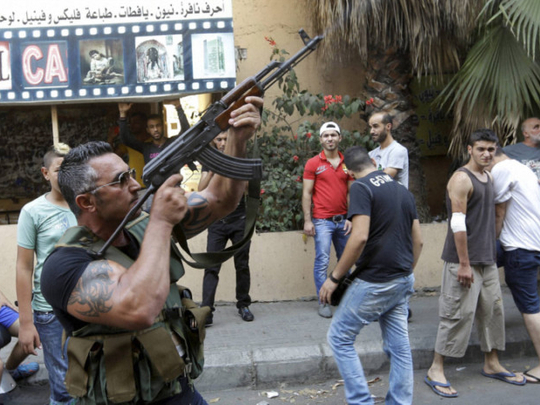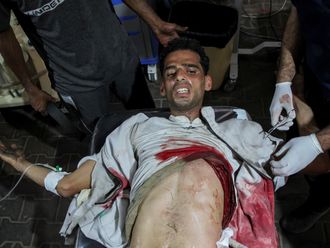
Beirut: Hezbollah’s leader said Friday that he is prepared to go to Syria personally to fight extremist Sunnis whom he blamed for the deadliest bombing in Beirut in at least eight years, an attack that analysts said could herald a new “dark era” of sectarian bombings targeting Lebanese civilians.
The car bomb, which killed at least 21 people, was the second in a little more than a month to hit the militant Shiite movement’s staunch support base in the Lebanese capital’s southern suburbs.
But unlike the first, which caused no deaths, the explosives-packed car that detonated Thursday evening outside a shoe store and a pastry shop appeared intended to cause maximum civilian casualties.
While Lebanon is no stranger to explosions, since the country’s 15-year civil war ended in 1990 they have largely taken the form of targeted assassinations, with the civilian lives lost as tragic collateral.
But since Hezbollah has begun sending fighters to Syria to help President Bashar Al Assad battle a largely Sunni opposition, the civil war there has taken an increasingly sectarian turn and reprisal attacks on the Shiite movement in Lebanon have multiplied.
Analysts cited Thursday’s bombing as evidence that Iraq-style sectarian bombings have now reached Lebanon as Sunni-Shiite divisions widen.
“This is no longer targeted assassinations of political and militant figures with clear political ends. It’s actually targeting the civilian population,” said Imad Salamey, an associate professor of political science at Lebanese American University.
“We are seeing the Iraqisation of Lebanon, a spillover from Iraq to Syria to Lebanon. This is massive, a potentially dark era, and God knows how it can be limited.”
In a televised speech from a secret location Friday, Hezbollah leader Hassan Nasrallah showed no sign of retreating from his decision to send fighters to Syria, a demand of the Syrian rebel groups that have threatened his movement.
“If you believe that by killing our women, and killing our children, and killing our innocent, and destroying our areas we might back up from our vision and our stand, you’re delusional,” he said, adding that preliminary investigations by Lebanese authorities had found “takfiri” Muslim groups responsible, a term for Sunni extremists.
Nasrallah said that if it is confirmed that the bombing was a retaliation for Hezbollah’s role in Syria, he is prepared to double the number of fighters there.
“If the battle with these takfiri terrorist people requires me and all of Hezbollah to go to Syria, we will all go to Syria,” he said.
“If we have 100 fighters in Syria they will become 200, If we have 1,000 they will become 2,000, and if we have 5,000 they will become 10,000.”
Near the blast site in the neighbourhood of Ruwais on Friday, investigators gathered evidence from the tangled wreckage and the number of fatalities climbed to 21 as more corpses were pulled out, according to the National News Agency.
The toll made it the deadliest bombing in Lebanon since former Prime Minister Rafiq Hariri’s assassination in 2005. A Hezbollah lawmaker told local media that 24 people had been killed, which would make it the most lethal since Lebanon’s civil war.











